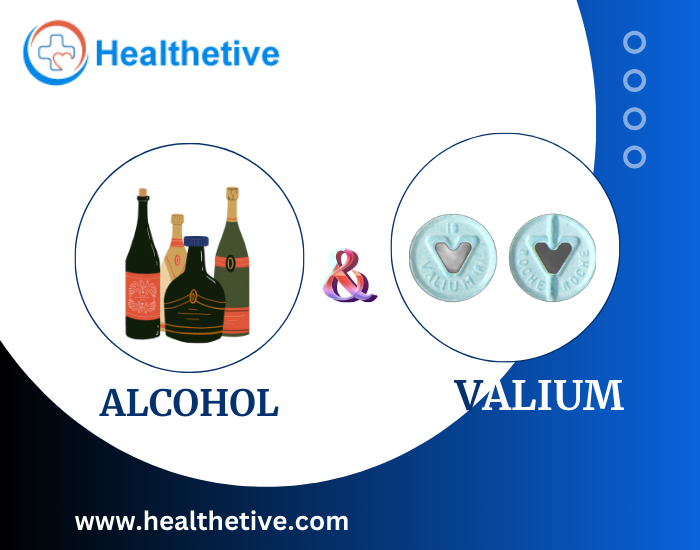Why People Take Valium And Alcohol Together:
Valium and alcohol are sedative-hypnotic drugs that can be dangerous when taken together. Valium is a benzodiazepine drug that is prescribed for anxiety, alcohol withdrawal, and skeletal muscle spasms. But Alcohol contains ethanol, which is a psychoactive and toxic substance that acts on the CNS and leads to the effects of intoxication. Valium and alcohol are central nervous system (CNS) depressants that can slow down the brain and nervous activity, which may lead to high health risks. In the articles, there is a detailed discussion of the potential risks of Valium and alcohol when taken together and their treatment.
Some people can take Valium and alcohol together for several reasons. Certain people are prescribed Valium to help with alcohol withdrawal symptoms during treatment of alcohol addiction. If the person can drink alcohol after improvement and while taking the drug. They can additied to both. Sometimes, Valium is prescribed for anxiety, but the drug can be mixed with alcohol inadvertently, which might be dangerous. Some people also try mixing Valium and alcohol for enjoyment purposes. They can mix the two drugs for experience, producing feelings of euphoria, relaxation, and a sense of well-being.
Risks Of Mixing Valium And Alcohol:
Combining Valium and alcohol is dangerous and has to be avoided. Both are central nervous system (CNS) depressants, which means they slow down brain activity, which can cause several harmful effects when taken together. The additive first stage can lead to some acute adverse reactions, including drowsiness, dizziness, impaired motor control, memory problems, slowed heartbeat, loss of consciousness, and severe respiratory depression.
Impact On The Central Nervous System:
The Central Nervous System(CNS) is a part of the nervous system that consists of the brain and spinal cord. It makes up the whole body with nervous, which connects the brain and spinal cord with the rest of the body, which receives, processes, and responds to sensory information, controlling physiological functions and thought processes. Significantly, Valium and alcohol can affect the CNS. Both substances individually cause drowsiness, slowed reflexes, confusion, memory loss, and decreased coordination. Unfortunately, when taking both substances together, they can depress the CNS and increase the risk of severe drowsiness, respiratory depression, and even coma or death.
Impact On Liver Health:
The liver is a very sensitive organ for metabolism and detoxification. However, try to avoid addictive substances that cause liver damage issues like Valium and alcohol. These substances can be used together and cause a risk of liver damage that leads to fatty liver disease, alcoholic hepatitis, and, ultimately, cirrhosis. These risks need to be medical interventions, from lifestyle changes to medications in severe cases and liver transplantation. Individually, both substance causes liver damage, which can include fatigue, loss of appetite, nausea, and abdominal discomfort
Withdrawal Symptoms of Valium And Alcohol:
Health experts do not recommend suddenly quitting the use of Valium and alcohol; consistency abusing combination of both substance cause physiological dependence. That dependency can increase the risk of withdrawal symptoms, which can be uncomfortable. They can experience these symptoms, including headache, insomnia, heart palpitations, dizziness, sweating, muscle tremors, anxiety, panic attacks, agitation, confusion, delusions, visual disturbances, hallucinations, seizures, and Delirium tremens.
In case of high-risk withdrawal symptoms, experts can manage the withdrawal process with a medical facility. They can gradually clear these substances from the body. Physicians can prescribe medication to help patients stay as comfortable as possible and provide monitoring and care to treat any side effects or complications.
Treatment for Polysubstance Addictions:
Once the broken physical dependency on Valium and alcohol. The next step to treat psychological addiction is done by therapeutic techniques and daily activity. Which helps to easily overcome the medication dependency and improve lifestyle.
- Group Therapy
- Cognitive behavioural therapies
- Relapse prevention techniques
- Family therapy
- Individual therapy sessions(cognitive behavioural therapy, dialectical behavioural therapy, trauma therapy)
- Alternative treatments like yoga, meditation and mindfulness exercises help to improve sleep, increase clarity and focus, and provide stress relief.
Common Medication Interaction Negative With Alcohol:
Alcohol is a highly addictive substance; its individual effects may be very dangerous. it interacts with some medications by increasing dangerous side effects or by decreasing the beneficial effects of medications like Valium and alcohol. The following are commonly prescribed medications that interact with alcohol to cause negative side effects:
- Benzodiazepines: alprazolam (Xanax), clonazepam (Klonopin), and lorazepam (Ativan).
- Insomnia: eszopiclone (Lunesta), zaleplon (Sonata), and zolpidem (Ambien, Edluar, and Zolpimist)
- Antidepressants: Tranylcypromine (Parnate), phenelzine (Nardil), and other antidepressants
- Opioids: Morphine, Methadone, Oxycodone, Fentanyl, and Hydrocodone.
- Over-the-counter pain relievers: ibuprofen (Advil, Motrin), naproxen (Aleve, Naprosyn), and aspirin.
Conclusion:
Valium and alcohol are polysubstance additives; when taken together, they can increase the risk and physical dependency and mostly affect the central nervous system and liver. However, never try to suddenly stop the drug as that can enhance the risk of withdrawal symptoms and make you uncomfortable. Follow the proper treatment under the supervision of health experts.

